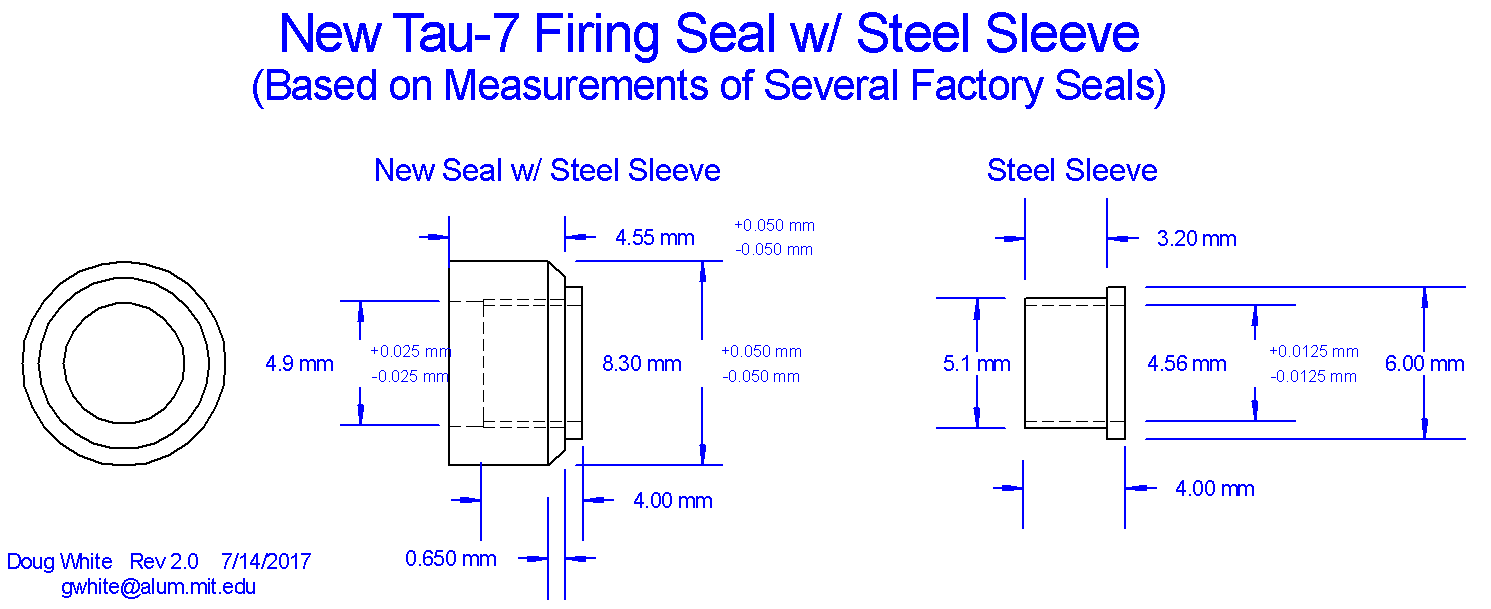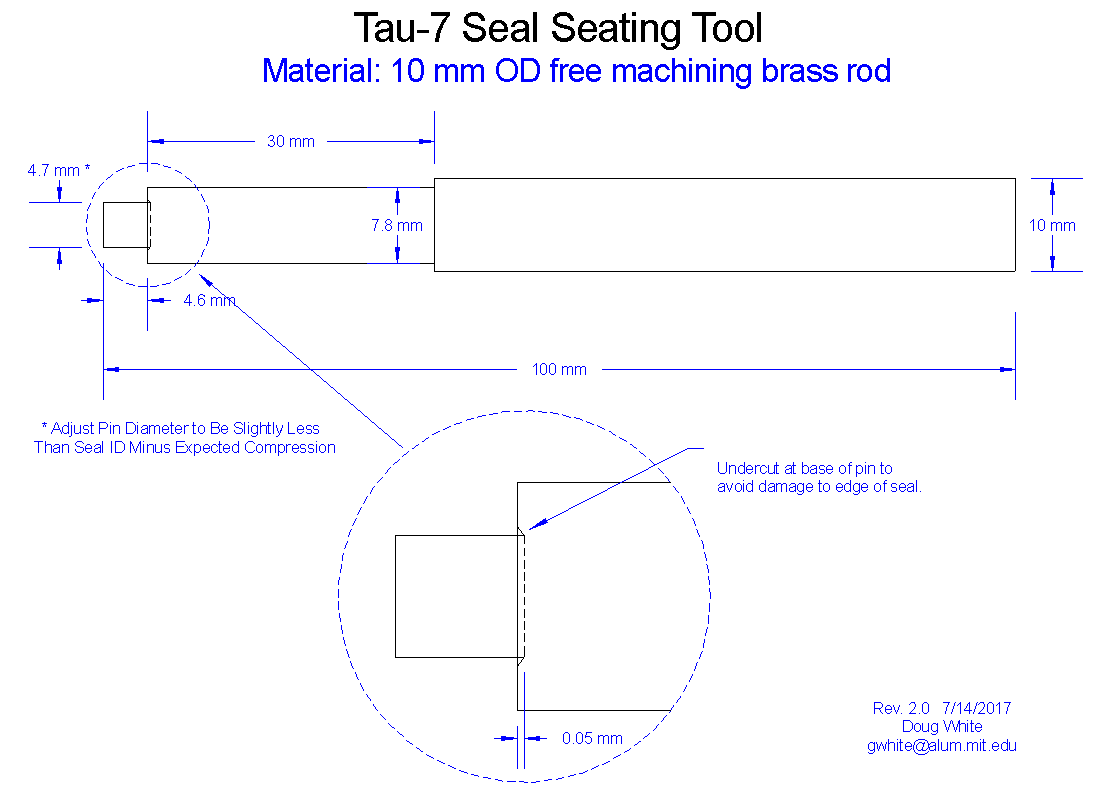Leaking Tau7
Moderators: pilkguns, m1963, David Levene, Spencer, Richard H
Forum rules
If you wish to make a donation to this forum's operation , it would be greatly appreciated.
https://www.paypal.com/paypalme/targettalk?yours=true
If you wish to make a donation to this forum's operation , it would be greatly appreciated.
https://www.paypal.com/paypalme/targettalk?yours=true
Leaking Tau7
Well, I had problems with my Tau7 after I replaced all the o-rings. It has been key holing. I thought I should replace the valve seal too 'while I was at it' before bothering to chrono the gun (bad idea). It did feel it was a bit slow when I was shooting it. I did get the valve seal out with the help of a tap that I threaded a turn or two. But after replacing the valve the gun just leaked out all the Co2. Had a look inside and I had put the valve seal insert in the wrong way (doh!!). So I took it out and made a new seal out of Delrin. Put that in and it still leaks...
I'm about to make a new seal!
Any tips on how a good seal should be fashioned!? I made the inside of the hole where the cone of the valve meets a little extra sharp. Is that wrong or a good idea? I Delrin too hard?
I'm about to make a new seal!
Any tips on how a good seal should be fashioned!? I made the inside of the hole where the cone of the valve meets a little extra sharp. Is that wrong or a good idea? I Delrin too hard?
Re: Leaking Tau7
There is a guy that hangs out on here. He is a Tau specialists. Can't remember his name know. Maybe he will respond.
Re: Leaking Tau7
That's probably me. I've made seals out of nylon, with mixed results. I have some factory seals I've been using, and they work better, but I think it's because I didn't make the nylon ones big enough. They are a very serious interference fit, like over 10 thousands of an inch on the diameter.. I've got to run, but I'll see if I can dig up a drawing I made with dimensions and post them later.
You need to make sure the inside is spotlessly clean, and I use silicone O-ring grease when I seat the seals. I used to use cotton swabs to clean out the inside, but I had to re-do one pistol after I got a cotton fiber stuck under the seal & it leaked.
Also, make sure the seating surface on the metal valve is smooth. Cooling from rapid decompression can cause condensation & rust. I've seen some pretty bad pitting on some valves.
As for keyholing, I suspect your velocity screw has backed out. It's under the fore-end. Just loosen the fore-end screw, don't remove it. It operates a clamp, and you can then slide the fore-end forward.
You need to make sure the inside is spotlessly clean, and I use silicone O-ring grease when I seat the seals. I used to use cotton swabs to clean out the inside, but I had to re-do one pistol after I got a cotton fiber stuck under the seal & it leaked.
Also, make sure the seating surface on the metal valve is smooth. Cooling from rapid decompression can cause condensation & rust. I've seen some pretty bad pitting on some valves.
As for keyholing, I suspect your velocity screw has backed out. It's under the fore-end. Just loosen the fore-end screw, don't remove it. It operates a clamp, and you can then slide the fore-end forward.
Re: Leaking Tau7
I miked the old seal at 8.252mm that is the only critical measurement as far as I can see. I will make one a little bigger, and also a tool to seat them with. I think it can be easy to damage the valve seating area when they are pushed into the hole. Thanks!
Re: Leaking Tau7
I found my drawings, but they need a little cleaning up. It sounds like you made the same mistake I did, which was to base my home-made seal diameter on an old seal. They clearly compress over time, because the used ones I've remove are nowhere near as large as the new ones from the factory.
I measured a bunch of new seals a while back, and they are pretty close to 8.3mm OD. These were an older style with a steel sleeve insert. The newer ones are solid plastic. I took a scrap of an old one and burned it. I forget the details, but between the flame, ash & smell, I was convinced at the time that it was nylon & not acetyl (Delrin).
I also made an insertion tool that has a pin to center on the seal, and the face that pushes on it is undercut near the base of the pin so as not to damage the critical corner of the hole in any way.
I measured a bunch of new seals a while back, and they are pretty close to 8.3mm OD. These were an older style with a steel sleeve insert. The newer ones are solid plastic. I took a scrap of an old one and burned it. I forget the details, but between the flame, ash & smell, I was convinced at the time that it was nylon & not acetyl (Delrin).
I also made an insertion tool that has a pin to center on the seal, and the face that pushes on it is undercut near the base of the pin so as not to damage the critical corner of the hole in any way.
Re: Leaking Tau7
I cleaned up my drawings and converted them to metric. One is for the old style seals with the metal insert sleeve. I believe the new ones without the sleeve have the same outer dimensions, only the sleeve is gone & the ID of the seal may be different. As long as the ID is bigger than the ID of the steel sleeve (plus a bit to account for compression on installation), you should be OK. The corner between the rear face and the hole is the critical area. You need REALLY sharp tools to avoid any burrs on that edge.




Re: Leaking Tau7
Thanks, more than I hoped for!
Re: Leaking Tau7
Let me know if you find that any of the dimensions need adjusting. The installer I made was sized to fit in the ones with the sleeve, but it's really too loose on the newer ones without the sleeve. I need to make a new one, but haven't gotten around to measuring the factory sleeves & calculating for the compression clearance.
The material I used was Nylon 6/6, which should be readily available. I don't see why Delrin wouldn't work (for a while). I'm not sure how hard it is or how stiff, impact resistant, etc. compared to the nylon, so it might not hold up as well in the long run. Some of the nylon seals I've removed have been heavily "dished" from the valve, and have presumably cold-flowed from being stored under pressure. Of course, they are also close to 30 years old...
The material I used was Nylon 6/6, which should be readily available. I don't see why Delrin wouldn't work (for a while). I'm not sure how hard it is or how stiff, impact resistant, etc. compared to the nylon, so it might not hold up as well in the long run. Some of the nylon seals I've removed have been heavily "dished" from the valve, and have presumably cold-flowed from being stored under pressure. Of course, they are also close to 30 years old...